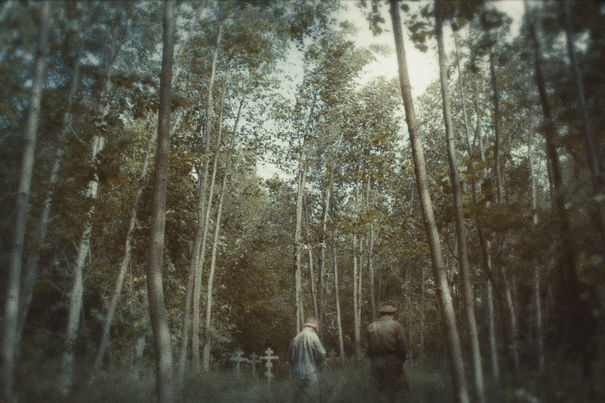Exhuming the Past
By Hugo Emmerzael

© Lenfilm Studios
As a student of Russian auteur Alexander Sokurov, Alexander Zolotukhin employs some of his mentor’s strategies in this harrowing, essayistic and critical debut about the worth of the Russian youth, running in Berlinale Forum.
While being immersed in the harrowing trench warfare of WWI, A RUSSIAN YOUTH (MALCHIK RUSSKIY, Russian Republic) also tries to focus on moments of playful tenderness on the front: young soldiers teasingly tickling each other, enjoying a windy drive on the back of a truck or some musical improvisations on the accordion. But ultimately, protagonist private Aleksei (Vladimir Korolev) is still one in the mould of Soviet war classics IVAN’S CHILDHOOD (IVANOVO DETSTVO, Andrei Tarkovsky, USSR) and COME AND SEE (IDI I SMOTRI, Elem Klimov, USSR). Like the tormented kids from these cinematic predecessors, young Aleksei also will be swallowed whole by the fog of war. What is different here is that he is literally shrouded in a fog of blindness.
A vicious German gas attack renders Aleksei permanently blind. Debuting director Alexander Zolotukhin reflects on this sensory deprivation by adding extra sonic layers. The editing by Tatyana Kuzmicheva crosscuts the fiction film with contemporary documentary footage of orchestra rehearsals for compositions of influential Russian composer Sergei Rachmaninoff. Musically commenting on the historical drama, the orchestra seems to take on the role of a Greek chorus, with the conductor as their own contemporary army commandant, guiding them through these notoriously challenging pieces.
This juxtaposition between fiction and documentary can disrupt the narrative flow of A RUSSIAN YOUTH, but it’s exactly this rupture of the historic by the contemporary that also showcases Zolotukhin’s biggest cinematic inspiration. The young director (born in 1988) has been supported by the Example of Intonation Fund, founded by Russian auteur Alexander Sokurov, who is credited here as a creative producer. In films like RUSSIAN ARK (RUSSKIY KOVCHEG, 2002) and FRANCOFONIA (2015), Sokurov also merged the historic with the contemporary to construct an essayistic style of cinema that reflects on Russia’s cultural and political legacy. “What is more important, culture or life?” he asked in a 2015 interview with The New York Times. “Or culture, life and the state? For what should we pay with our lives?”
This question also lies at the heart of A RUSSIAN YOUTH. For what exactly does the blindsighted Aleksei risk his life on the front? Unlike Tarkovsky, Klimov and Sokurov, Zolotukhin is generations removed from the Great Wars that hung like a curse over the former Soviet Union. His is the first generation raised in the new Russian republic of president-elects Yeltsin and Putin. By exhuming the traumatic events that were part of Soviet DNA, Zolotukhin raises Sokurov’s questions again, but for a new iteration of a Russian youth. Their grand narrative is obscured, their enemy not easily identifiable. Yet they are still at war, or at risk. Is this what all the Russian youth have paid their lives for?

